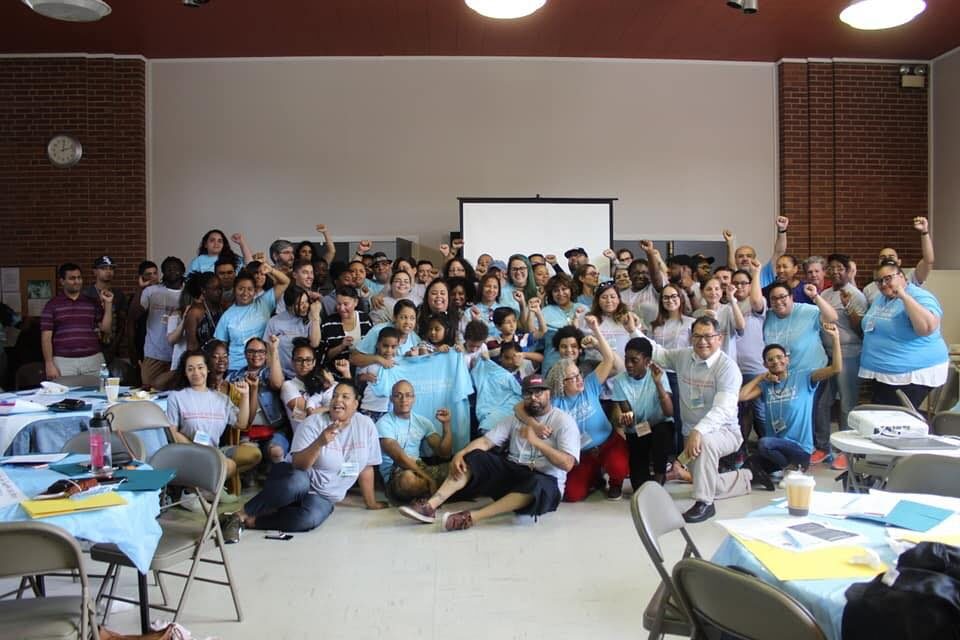Sowing Seeds to Deep Democracy
October 10, 2019
Neighbor to Neighbor is a multi-issue, grassroots, environmental justice organization based in 4 chapters within Massachusetts: Lynn, Worcester, Holyoke, and Springfield. Neighbor to Neighbor’s base is rooted in the “new majority” – people of color, immigrants, working class, and women in each of these cities. In my short time there, I actively worked on several projects that included public transportation access, displacement gentrification, natural gas pipeline prevention, and police brutality. Though the campaigns for each chapter differed, the chapters are unified in the belief of a deep democracy.
Deep democracy comes when communities make the decisions that impact their everyday lives.[i] Neighbor to Neighbor works to achieve this by educating, engaging, and empowering its membership to push current people in power to respond to the community’s visions. Neighbor to Neighbor (an organizational member of the Green Justice Coalition) worked within the Green Justice Coalition (GJC), in July, to convince the Fiscal Management Control Board (FMCB) of the public transit system (MBTA) to approve of a low-income fare.
The Green Justice Coalition believes that public transit is a public good, so it needs to serve the people. In Boston, with housing prices skyrocketing, low-income folks are displaced to the outskirts of the transit system. This displacement forces low-income people to spend significant funds on transportation leaving little money to save or spend.[ii] Early this year, despite the fact that the FMCB raised fares to increase funds for the T[iii], the service continued to decline with multiple train derailments and undependable bus service. GJC heard from its members that the decision to increase fairs significantly impacted their and their fellow community members’ financial stability. To coalesce the people’s power and persuade the FMCB to pass a low-income fare, we started a postcard campaign to collect the stories from our bases and other T-riders. Repeatedly, riders spoke about how they used the T to get to work, school, and complete errands and that the prices were making it harder for them to get by.
My takeaways from the campaign process are:
- Vision big and know your community’s power. As someone who is disillusioned by how power works in our current systems, I struggled to think about implementing change. However, being around the organizers who feel the power of their communities daily helped us to think big about the impact we could have .
- Approach from multiple directions. The base of our strategy was to work the “outside” by getting the public involved. However, GJC also met with board members, researched and collected statistics, and partnered with others to amplify the coalition’s voices.
- Hold steadfast to values and vision of the community. In meeting with folks of differing perspectives throughout the month, I could feel my vision of implementation changing. However, GJC consistently stuck to its vision because they knew and deeply loved the people in their base, so they would not be distracted.
- Take the necessary time. Deep democracy takes time because the purpose is to bring multiple experiences in and to iterate. This begins with campaign implementation and finishes with the administration of the win. If the people’s power is the central value, relish in the process because there is so much to learn.
- Know when to and when not to compromise. When running a campaign, institutions and individuals in opposition or in power will respond with the different constraints of the system. However, I learned that you cannot start with a willingness to compromise. Those constraints are in position because the system is built to privilege those with money and political power. Therefore, as the people who are building power to oppose this oligarchy, we need to challenge the made-up constraints.
By the end of this part of the campaign, we collected over 1,000 signatures from throughout the Greater Boston Area. At the meeting, the FMCB responded by including the low-income fare on the next month’s meeting agenda and requesting a feasibility study of this fare’s administration. By bringing the people’s power forward, we took one step forward in implementing our vision: an affordable, public transit system.
[i] Movement Generation. (January 2017). From banks and tanks to cooperation and caring: A strategic framework for a just transition. [Zine]. Vol 1. https://movementgeneration.org/wp-content/uploads/2016/11/JT_booklet_English_SPREADs_web.pdf
[ii] Community Labor United. (July 2019). Our economy needs a transit system that works for all. [Flyer]. Boston, MA: 617MediaGroup.
[iii] T refers to the subways of the MBTA.
About Cyatharine Alias


